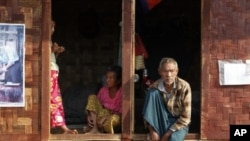Rights groups say Burmese military abuses continue in northern Kachin state including torture, rape, and deliberate attacks on civilians. Fighting between Burma’s military and ethnic Kachin rebels has displaced tens of thousands of civilians, but authorities are refusing to allow humanitarian aid to rebel-controlled areas.
Abuses continue
Human Rights Watch says that, despite Burma’s recent political reforms that have won widespread international praise, there has been no significant change in abuses committed by the country’s military.
In a report released Tuesday, the New York-based group details numerous rights violations it says were committed in the last year in northern Kachin state.
Matthew Smith, a researcher with the group, spoke to the Foreign Correspondents Club of Thailand.
“The army has forced men, women, and children to serve as porters on the front lines of the fighting. It has deliberately attacked Kachin civilians and villages," said Smith. "It has killed Kachin civilians, tortured civilian detainees, and committed rape and other forms of sexual violence.”
Fighting broke out in June between the army and Kachin rebels, ending a 17-year ceasefire.
Human Rights Watch says both sides are guilty of recruiting child soldiers, some as young as 14.
Land mines
They are also laying fresh land mines that at least one side, the Kachin Independence Army (KIA) is failing to map at the risk of civilians and even its own fighters. Human Rights Watch says more than 40 KIA rebels were killed by their own land mines in the last year.
The clashes have displaced at least 75,000 civilians around the Burma-China border and made them dependent on humanitarian aid.
Although authorities have allowed aid groups to help those in government-controlled areas, they only allowed access once, in December, to 45,000 refugees in rebel-held territory.
Phil Robertson, deputy Asia director for Human Rights Watch, says refusing aid violates international humanitarian law.
“This is a decision by the Burma government not the Burma army. But, this is the Burma government,' said Robertson. "This is the reform government of Burma that people keep talking about as, you know leading the way and denying humanitarian access in a systematic way.”
Robertson says international pressure is needed to ensure authorities allow aid to flow sustained and unhindered to those in need.
Human Rights Watch is also calling for Burma to allow an independent, international mechanism to investigate allegations of abuse.




